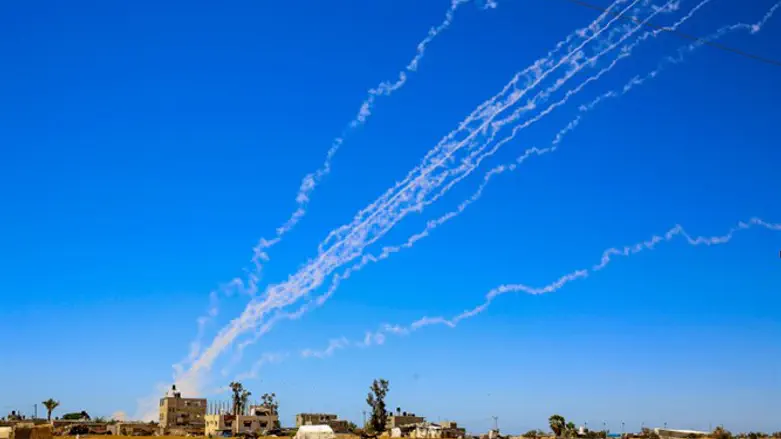
The current events between the Palestinian Arabs, Hamas and Israel have suggested one thing: calm does not mean the end of violence. They have proven that periods of silence are merely a prelude to new episodes of brutality, war and butchery when one group continues to want to destroy the other. This is not a basis on which to talk about the future of security and stability of populations.
Millions of Palestinian Arabs and Israelis have the right to live in security. They have to be able to stay in their homes without fearing that their rooms will be their eternal graves in escalations into war.
I am not exaggerating if I say war. The wars that people used to watch in the distant and near past are gone forever. The world is watching their shifting nature in such scenes. Clashes are taking place between organizations and armies, or between organizations.
Now, if we are used to these scenes, that does not mean that they are less dangerous than conventional wars. The danger is even greater. Indeed, it targets civilians and sows fear, anxiety and panic from desert battlefields into the hearts of mothers, children and elderly people in the cities and streets.
In the midst of this whirlwind of turmoil, hustle, bustle, media squawks, and knee-jerk reactions, some campaigns are fanning the fires of sedition. These are led by media outlets loyal to certain parties and countries that see the flare-up of a vast Middle East conflict as a valuable opportunity to muddy the waters and extract gains at the expense of innocent civilians, both Palestinian and Israeli.
They are supported by many crisis-ridden parties who suffer from problems at various levels. These have found in escalation a valuable cop-out to mask their failures in managing their own crises.
In this panorama, our region may be in urgent and pressing need of the voice of reason and absent wisdom. Many regional and international parties lack the political will to deal with the current wave of violence. Others cannot develop a clear vision to understand what is really happening and make the right decision. Others are preoccupied with other issues that they believe are more important.
Certainly, it is too early to draw lessons from what is happening. But we have been experiencing a recurring scene for the past two decades. The scenarios are so similar that the observer will feel somewhat foolish if he cannot understand the environment of this turmoil and draw conclusions.
Events unfold amidst the confusion that plagues the political and security decisions and behaviors of all without exception. Nevertheless, everyone must be aware that any calm without real foundations of peace, security and stability in this volatile geographical area (points of contact between millions of Palestinian Arabs and Israelis) will not be synonymous with a better tomorrow.
Truth be told, everyone needs to think rationally about the future of millions of children and young people on both sides, their destiny and their right to live in security.
It is not a matter of mediation, of temporary ceasefires. It may succeed in stopping rocket fire, air strikes and a possible ground war. But it will not lay a real foundation for stability if it is not followed by a genuine effort to eradicate the causes of conflict and violence known to all.
Peace through just solutions and approaches is neither a utopia nor an impossibility in our world. The condition? A good and strong political will to make peace. Also, everyone in our region has to pay attention to the seriousness of sowing hatred and rejection that carries all the danger for the future of tens of millions of people in the Middle East.
Many, such as terrorist organizations, sponsoring regimes, and expansionist states who believe they can threaten the existence of another state, feed on the disruption of an already fragile coexistence. They fuel a culture of hatred and push violent policies based on confrontation not only with Israel but also with other Arab countries and populations.
I do not deny that such people also exist in Israel. The hardliners on both sides are always ready to blow the fire of sedition. This is the climate that can ensure their media and political presence if attention is ever turned.
Coexistence is the only solid ground that guarantees the survival of all in a region often undermined by the factors of conflict and violence. There is no way to win unilaterally or to exclude the other - but that does not mean including terrorist organizations or their members. .
The only way that all peace-loving regional and international powers must work on is to immediately take the initiative and seek serious political solutions, as well as to make a sustained effort to instill a culture of coexistence. At least, this is what must be done if we want to ensure a more secure and stable future for coming generations.
Salem AlKetbi is a UAE political analyst and former Federal National Council candidate